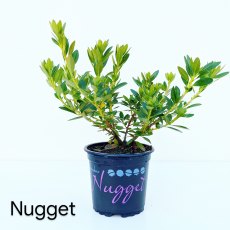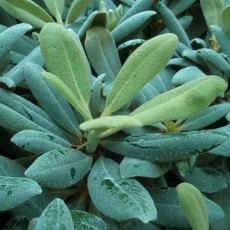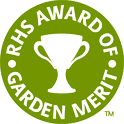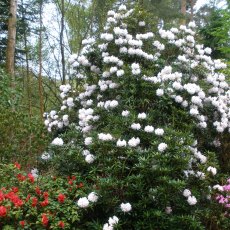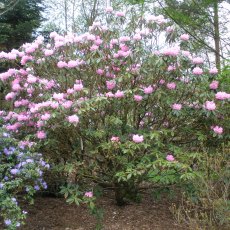Rhododendron suoilenhense (seedlings from AC 4458)
Item: SSUO
 In stock
In stock
April
White & Cream
150-175cm
Not Scented
Yes
To -10 °C
Collect in Store
This item is available for collection.
Home Delivery
UK mainland delivery from £8.95
Picture of a 3 litre plant for illustrative purposes only
(GRANDIA H4-5) Recently collected from Vietnam. Creamy white campanulate flowers with maroon basal flashes, in a rounded truss, April. Large foliage with indumentum on older leaves. Early intoductions to the UK have produced tall, majestic and fast growing trees when grown in good conditions. Full hardiness is not confirmed yet, but it seems to be hardier than other big leaved rhododendrons such as R. macabeanum or R. sinogrande. Height 150-175cm in 10 years. Requires moist acid soils.
First introduced by Alan Clark and Keith Rushforth in 1992, collected in Lao Cai province, Vietnam. Growing between 2200-3140 metres, mature plants reach heights of 12 metres.
Flowers are broadly tubular campanulate, 8 lobed, in a truss of 15 flowers. One of the distinguishing features of R. suoilenhense is the juvenile foliage differing from the foliage of a mature flowering plant. Juvenile foliage is widely oblong, rugose, chartaceous (papery) and glabrous, with a wavy appearance. Mature leaves are elliptic to oblanceolate, dark green, shiny and almost flat, with a suede like brown unistrate indumentum on the lower surface, and measure 20-35cm long by 9-16cm broad, with a rounded apex. Petiole is round.
Customer Reviews



















Good to know
Wonderful architectural plants with huge leaves up to 60cm long! These are choice woodland Rhododendrons needing the very best sheltered positions to allow them to grow to their full stature of up to 5 metres. As a bonus, flowering will typically start after 6 years, but can take up to 10 years. Big leaved Rhododendrons are among the more tender of our range, but are well worth trying if you have the correct conditions. They are best suited to sheltered woodland in the milder regions of the UK, though they can also be used as feature plants in sheltered courtyard gardens. Winter protection is recommended for young plants.
Rhododendrons like moist acidic soil, with good drainage, and plenty of organic matter such as leaf-mould and added ericaceous compost. Big-leaved species should be given the best planting positions, which are neither too wet nor too dry. For a guide to plant spacing, use the height we give in 10 years as a guide to the distance between each plant, or approximately 1 plant per 3m². Plant no deeper than the top of the rootball, and dig in plenty of good ericaceous compost around the sides. A teaspoon of slow release feed is sufficient for a 3 litre plant, rising to a small handful for a mature plant. Plants can be grown as single stemmed trees, or the leader can be pruned as a young plant to encourage a more bushy habit. You may need to give protection from deer rubbing their antlers on the stems
Please note: Big leaved Rhododendrons need to be sheltered from wind to prevent the large leaves being broken off at the petioles (stalks) during gales. Moisture control is critical to prevent moisture stress and misshapen leaves, so we do not recommend them being grown in pots.
For further advice, For further advice, see here
Size Guide

The Basics
Ideal soil
Acidic soil, good organic content, pH 4.5-6.0. Inkarho range of rhododendrons will tolerate soils up to pH7.5
Sun or Shade
Light dappled shade is best for most varieties.
Shelter
Refer to hardiness rating. Give young plants protection.
Site Selection
Avoid close to trees, roots, invasive weeds, walls, hot patios, dry banks and waterlogged soils. Do not use weed matting or stone mulch.
Plant spacing
Use the height shown in 10 years as a guide to the distance between each plant. Allow room for plant to fill out. If planting closer for instant impact, be prepared to move plants after a few years.
Compost
- 3 litre pot, dig in 10-20 litres of ericaceous compost.
- 7.5 litre pot, dig in 20-30 litres of ericaceous compost.
- 70-80cm specimen, dig in 60 litres of ericaceous compost.
- 100-120cm specimen, dig in 120 litres of ericaceous compost.
Planting depth
Plant high in the ground, with the top of the rootball visible.
Feeding
Slow-release ericaceous feed recommended in March and straight after flowering.
Mulch
Recommended every few years.
Water
The key ingredient! Keep moist all season, especially the critical time at end of June for flower bud initiation. Tap water is better than no water. Heavy dose at least once per week in dry weather.
Drainage
Ensure good drainage in winter, especially with yellow flowering varieties. Avoid waterlogged sites.
Pruning
Rhododendrons and Camellias: Not normally required. Tidy wayward shoots after flowering.
Evergreen azaleas and Bloombux can be clipped into a low hedge.
Magnolias and Acers: Formative pruning when young to shape into a tree or bush.
Deadheading
Remove old flower-heads, particularly on young or weak plants.
For further advice see here
Delivery & Returns
Our website calculates the delivery charge according to weight and delivery location throughout the UK. To see these charges, please enter your postcode at the checkout, and you will see the charge vary as you add more items to your wheelbarrow.
 Millais Nurseries
Millais Nurseries



